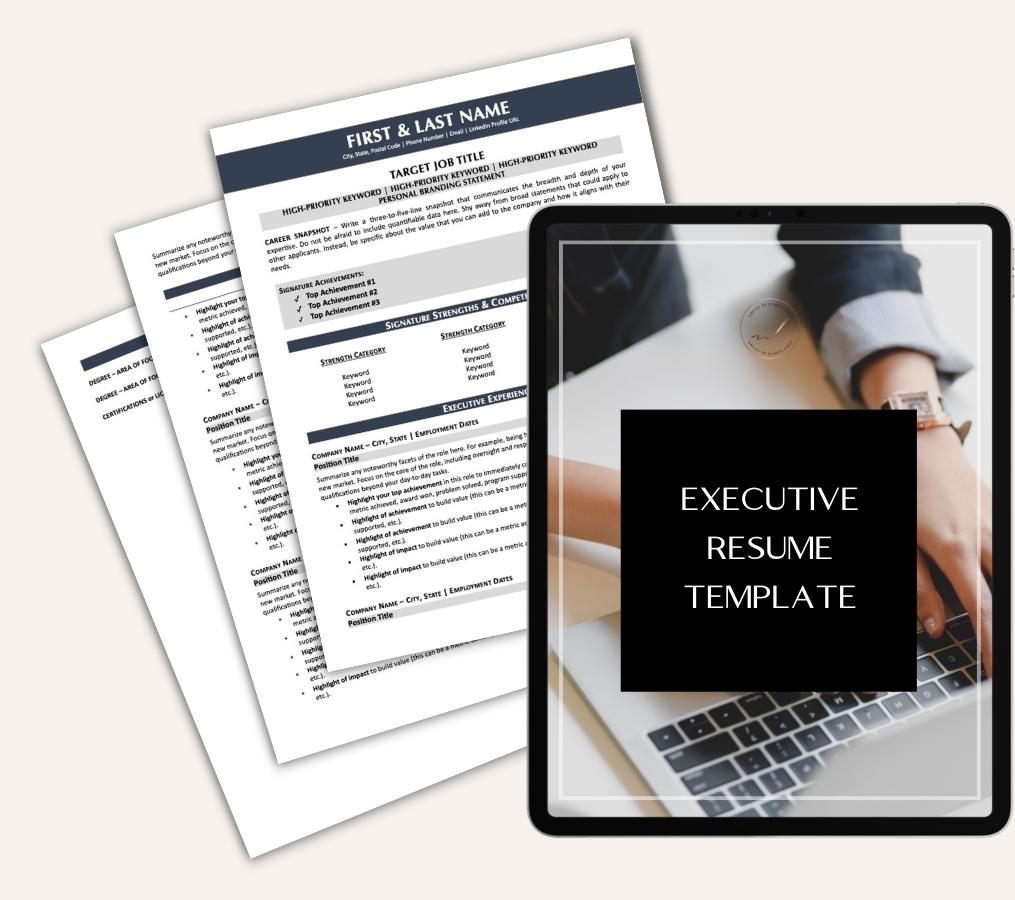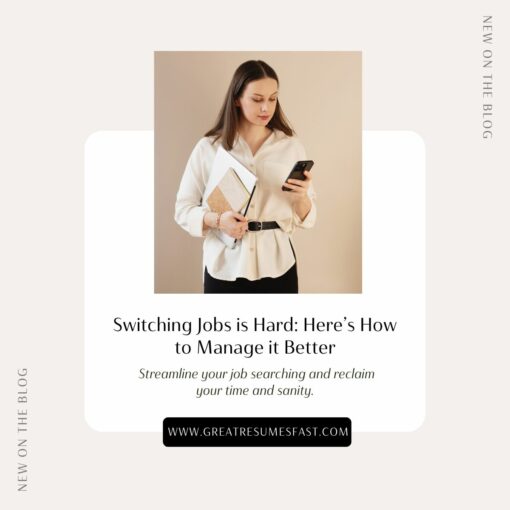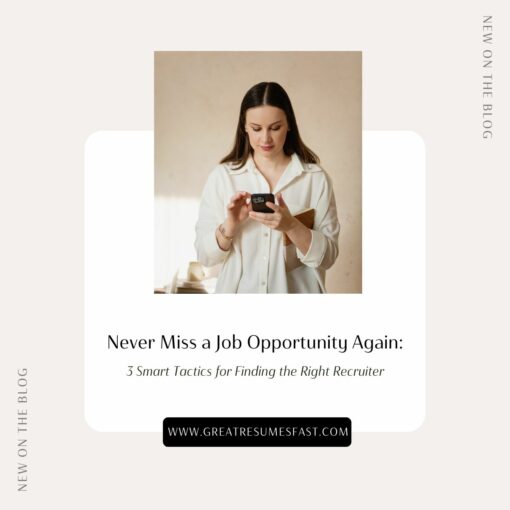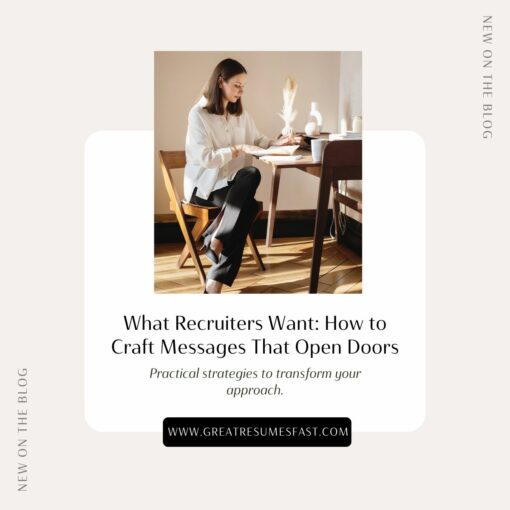How to Make the Most of 2022’s Hot Job Market
Are you hoping to make the most of 2022’s hot job market? Hiring continues to surge to new levels with it currently at its highest since 2015. Professionals are on the move, seeking higher income due to inflation and job burnout. And workers are holding all the cards as the talent shortage has opened new doors of opportunity for those seeking a career move. Whether you’re looking for a raise, promotion, new job, industry change, more flexibility, or to become an expert in your field, 2022 is the year you can make it happen. Let’s dive into the different ways you can make the most of 2022’s hot job market.

Make Yourself More Marketable
Before you make any type of move to advance your career, your first step is to make yourself more marketable. This applies to you if you’re making a career move or working to become an expert in your field. The first step is to prepare your career marketing documents. Your resume, cover letter, and especially your LinkedIn profile will be your public-facing marketing documents.
Make sure your resume reflects modern writing practices, and that it is results-rich and story-based for maximum impact.
The one thing you need most no matter how you plan to make the most of 2022’s job market is an up-to-date list of your recent wins.
Think about all of your recent contributions, accomplishments, and results. Make a running list of them. In fact, start a Google doc right now that you can keep adding to as your career grows. You’ll draw from this list when you approach your boss for a raise, interview for a promotion, switch industries, become an expert in your field, and expand your network. It’s an invaluable tool and I encourage you not to wait until you’re ready to job search to update your list. The impactful data that will make you look your best to potential employers is incredibly hard to remember 3, 5, and 10 years down the road.
Key information you need to gather when sitting down to write your resume includes:
– What projects/initiatives you are involved in
– The goals and results of your efforts
– Any quantifiable outcomes related to cost savings, revenue growth, client retention, etc.
– Performance improvements/promotions of employees tied to your coaching/mentorship
– Feedback on your own performance from employees, peers, supervisors
– Any achievements or contributions that relate to the position you are interested in
A common mistake when it comes to resume writing is to try to include everything you have ever done. But including every responsibility, every technology, your full education history, and all skills and abilities you can claim will quickly turn your resume into an unreadable, overwhelming document.
If you can answer “yes” to any of these questions, your resume needs some revamping:
1.) Is there a lot of redundant information?
2.) Is the resume more than the standard two to three pages?
3.) Could the career summary be copied and pasted into someone else’s resume without many changes? (As in, could it apply to multiple people?)
4.) Are you listing skills rather than focusing on results?
5.) Are there relevant experiences or skills that are not conveyed on page one?
The next step in making yourself more marketable is to consistently network. Networking isn’t a job search activity. It’s a long-term career management activity. Cultivate new connections, strengthen current connections, and engage with people on a regular basis. This does not have to be a difficult or time-consuming endeavor. It can be as simple as connecting with three to five people in your industry on LinkedIn every week and spending 10-15 minutes commenting on posts, sharing updates, and sending messages three to four days per week.
Just remember relationships need to be mutually beneficial and they take time to grow. You can’t make a big ask the first time you speak to someone and expect them to help you. Instead, you grow your relationships over time by helping, supporting, and encouraging others and when the time comes, your network will be there for you, too.
Become an Expert
This is another strategy that is great for your long-term career management. If you want to be more marketable, you need to become an expert in your field. That doesn’t mean you need to know everything about your industry. It means that you need to specialize. Narrow your focus and pick one specific topic of interest. Then gather all the knowledge and information you can about that one area.
Here’s an example to explain what I mean. I’m a resume writer. I’ve chosen to narrow my focus to executive resume writing with a specialization in personal branding. I’m a certified personal branding strategist and the personal branding process is integral in the writing work that my team and I do for our clients. It’s where I specialize, and our process is largely responsible for our success in our field.
Perhaps you’re a digital marketing expert but you’re really passionate about social media marketing on LinkedIn. The larger industry is digital marketing, the role within the industry is social media marketing, but your area of expertise is LinkedIn.
Narrow down your focus and pick a topic. Then invest three to five hours a week for several weeks learning all you can about your area of expertise. Once you’ve gained knowledge in your industry, go out and make your own great finds. Try out a new strategy or tactic to see what happens.
Once you’ve made some discoveries of your own and gained more comprehensive knowledge in your area of expertise, passionately share what you know and add value. Create informational posts on LinkedIn, write blog articles, or go to social media sites and industry groups and offer your advice in response to questions.
Be generous with your knowledge and people will like, follow, and engage with you. This increases your marketability as you become known as a go-to resource on your specific subject matter.
Ask for a Raise
If you’re happy where you are, get your list together and ask for a raise. The BBC reports that the recent talent shortage has given workers the upper hand. Employers are offering higher pay, better perks, and more flexibility. This agrees with LinkedIn’s recent Workforce Confidence Index which shows 56% of those looking to make a career move are doing so for higher pay. Employers are scrambling to figure out how to retain their current workforce while simultaneously building it. With the current market so favorable for workers, it’s the perfect time to ask for a raise.
At the beginning of this article, I advised you to pull together a list of your biggest wins and contributions. Employers love to hire winners and they also love to reward winners. The biggest obstacle to getting the raise you’re asking for is being prepared to ask.
Create a comprehensive list of your results and contributions since your last review. Focus on providing data that shows results. Whenever you can, include dollars, percentages, timeframes, comparisons, how much, how many, how long, and over what period of time. These metrics are impactful and persuasive. Schedule a meeting time with your boss, bring your list for them to review, and after they’ve had an opportunity to review it, discuss the outcomes you’ve generated for the company and their positive impacts. With this data in hand, ask your boss for a raise.
As a side note: inflation was at 6.2% as of October 2021 so make sure when you ask for a raise you request more than the current rate of inflation. Otherwise, you’re breaking even and not getting yourself a raise. And listen, all previous “rules” are off the table. If in the past you’ve been told that there’s a salary cap in your position, don’t let that stop you. The market has changed and you hold the cards. Ask for the raise.
Consider an Industry Change
Countless studies and surveys are being released with alarming statistics regarding worker burnout. The Hartford recently released data from their survey that revealed 68% of women are feeling burned out and 52% of men are burned out. This agrees with the data Indeed gathered in its survey—52% of their survey respondents said they were burned out.
“A recent study by the World Health Organization and the International Labour Organization found that working at least 55 hours a week was causing hundreds of thousands of premature deaths and was linked to a higher risk of stroke and heart disease. Long hours were described as ‘a serious health hazard.’” – The Guardian, A Career Change Saved My Life
If you’re finding that you’re unhappy or burned out, now is a good time to consider a career change.
If your career has become your identity, HBR has a great article on how to separate your career from your identity.
Here are three key areas of your resume that you need to make adjustments to when switching careers:
1. Your Job Target / Job Title: Make sure you’re not falling into the trap of listing multiple job targets or titles at the top of your resume. I know it can be tempting when you’re qualified for more than one type of role, or you’re seeking something—anything—different from what you’re doing now. Instead, focus on one position at a time, and put this at the top of your resume:
JOB TARGET: Information Technology Manager
2. Your personal branding statement: Think about what unique attributes and experiences you can bring to this new role, then combine those into a one-line statement that speaks to the position for which you’re applying.
3. Your work history bullet points: Reorder the bullet points underneath each position on your resume so that the most relevant experience and accomplishments are listed first. Always list bullet points from each position in the order of relevancy from most relevant to least relevant. This shows the hiring manager that although you may not have operated within that exact role in your past career, you still have the related skills and experience necessary to do the job.
Make a Move Up
Want to advance your career but love the company you’re at now? Talk to your boss about a promotion. Find out what opportunities are available to you within your department or outside of it. LinkedIn recently put together a list of the top jobs for career growth and the top industries for career growth. If you’re in one of the top jobs or top industries, now is the perfect time to seek a promotion. Not to mention, the job market is favorable for workers due to the current talent shortage.
According to LinkedIn’s Workforce Report, the promotion rate has increased 9% between January-October 2021. If you’re in one of these top industries, the promotion rate is extremely high. With a promotion rate of 249%, it’s a great time to be a product manager.
Prepare for a promotion similar to how I advised you to get ready to ask for a raise. Start by creating a list of your wins and contributions. The biggest difference is that your list for promotion needs to be geared towards contributions and accomplishments that align well with the promotion you want. When you update your resume, you’ll want to include the accomplishments geared toward the new role. Show where you’ve already tackled a similar project or problem and had a successful outcome. Talk about leadership or related experiences you’ve gained that have prepared you for this new role.
If you don’t have a specific objective or career advancement plan in mind, it is very difficult to write an effective resume or cover letter. Career planning is important at all stages of your career.
Questions to ask yourself to help determine your short-term and long-term goals:
– Where do you want to be (in your career) next year? And in five years?
– What aspects of your current job do you love the most?
– What are your priorities for your next position? (Salary, location, work/life balance?)
– What skills / work experience / credentials are standard for the position you are pursuing?
The best approach to a high-impact resume to help you move up the career ladder is to keep it laser-focused on the most relevant skills, experience, and qualifications that will show your ability to succeed in a higher-level position than you currently hold.
For example, Janet, a recent client of Great Resumes Fast, wanted to move from her position as a registered nurse (RN) to a home health services manager. While her nursing experience and strong knowledge base of patient care and healthcare, in general, were obviously important, the management position also called for a leadership and budget management skill set that she did not have the opportunity to gain through her prior nursing jobs.
During the course of the phone consultation with her resume writer, it came out that Janet had not included the small janitorial business that she had founded while completing her nursing degree because she assumed it would not matter for a healthcare resume. But in that leadership role, not only had she hired, trained, and supervised a small team, but she had also managed the company’s budget and grown the revenue 25% YOY for several years. Highlighting these relevant accomplishments helped to align her resume with the required qualifications of the job posting far more than her nursing experience alone could have.
If you need more help writing a resume for a promotion, check out this article which includes a broad range of advice or this article on resume writing tips for promotion.
Seek Remote or Flexible Work Opportunities
Remote work has experienced a 159% growth rate. And the average remote worker saves 51 minutes a day. That’s more than an extra four hours added to your week. What could you do with an extra four hours? More quality family time? Pick up a new hobby? Read a work of classic literature? The options are endless.
The key to successful remote work is preventing workplace burnout. It’s best to go into remote work with your eyes wide open. In a recent article on Bloomberg, the authors of the new book Out of Office point out the importance of a healthy work perspective to counter burnout.
If you’re ready to pursue remote work here are the 10 jobs with the most remote work possibilities. A plethora of companies are now offering flexible schedules, hybrid work, and remote work. A simple Google search can reveal companies that are hiring for remote opportunities. You can also filter jobs on LinkedIn by remote work openings and even set your profile settings so that recruiters can see you’re open to new remote work opportunities.
I’m sure I sound like a broken record, but if you’re considering a change for better flexibility or fully remote work, now is a great time to make your move.
Whether you’re looking for an industry change, better work culture, healthier work/life balance, or a move up, remember the two most important things you must do: become more marketable and position yourself as an expert. Doing these two things first will make whatever career move you want to make in 2022 an easier and quicker one.
Thanks for reading! Want more job search and resume tips? Check out these 6 free resources on my website that have helped more than 25,000 job seekers land their next job.
#jobseekers #jobsearch #careers
Share this post:

About the author
Jessica Hernandez, President, CEO & Founder of Great Resumes Fast
Hi, I’m Jessica. I started this company back in 2008 after more than a decade directing hiring practices at Fortune 500 companies.
What started as a side hustle (before that was even a word!) helping friends of friends with their resumes has now grown into a company that serves hundreds of happy clients a year. But the personal touch? I’ve kept that.
You might have seen me featured as a resume expert in publications like Forbes, Fast Company, and Fortune. And in 2020, I was honored to be named as a LinkedIn Top Voice of the year!
I’m so glad you’re here, and I can’t wait to help you find your next perfect-fit position!
Improve Your Resume: Download Your Free Executive Resume Template Today
Are you struggling to create an executive resume that will impress employers? Download this free executive resume template and receive a series of 10 emails with expert guidance on how to write resume content that resonates with employers so you get more interviews.
It's everything you need to stand out, make an impression, and accelerate your job search.








